Personal is Political: The Myth of Diversity and Critical Thinking in American Academia
By Brittany Chávez and Louis Yako
The authors of this piece refuse the pitfalls of identity politics, but we both connect deeply and find ourselves situated with people, whom, in today’s world, count as “the wretched of the earth.” What is at stake in these two stories is far from just personal. We explicitly pull from the feminist adage “the personal is political” in politicizing our stories and choosing not to be silenced. We are also two dear friends, writing in two voices, together, both located at major Research One American universities and thriving in our doctoral programs. We found one another in a shared class during our doctoral coursework, and we cling to like- minded individuals so that we can be with those who understand, find a way to stay, and help each other not feel isolated and insignificant. As it will become clear to any reader of these stories, race, class, gender, sexuality, nation, citizenship and belonging are all intersectional, and oppression is systematic.
Voice 1
I am an Afro-diasporic, border-jumping artist-scholar-activist. I spend most of my time living and working in México. I am invested in decolonial projects of sensing, being, and doing.
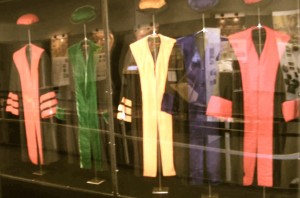 At the end of last year, I attended the major conference for my discipline on the East Coast of the United States. At this conference, my former MA professor, a straight white heteronormative male whom I had stopped talking to because of his blatant sexist and racist aggressions towards me in the past, was present. In typical hypocritical academic “collegiality,” he approached me, uninvited, and began to spew his mouth, per usual. The hair on my back prickled as he came closer to me. “So how is the program going for you? Are you pissing off the right people?” he asked me sarcastically. (He was the only person I pissed off in my MA, because I intimidated him.) I told him, very casually, that I was doing great and would soon enter the exam and prospectus stages of the doctorate. He continued, “Well, you know, because you are a woman of color, people are going to be easy on you. Therefore, you seek out this white straight male professor to ask you the proper critical questions, because no one else is going to do that for you.” Incredulously, I stared at him in shock, saying I would never choose to work with the person he had recommended because it made no sense for my work. He continued to insist; meanwhile, in my total dumbfoundedness, I could not come up with a proper smart aleck retort that I later wished I had. I wish I would have come up with something that would have allowed me to walk away from that situation with a sense of my dignity being in tact.
At the end of last year, I attended the major conference for my discipline on the East Coast of the United States. At this conference, my former MA professor, a straight white heteronormative male whom I had stopped talking to because of his blatant sexist and racist aggressions towards me in the past, was present. In typical hypocritical academic “collegiality,” he approached me, uninvited, and began to spew his mouth, per usual. The hair on my back prickled as he came closer to me. “So how is the program going for you? Are you pissing off the right people?” he asked me sarcastically. (He was the only person I pissed off in my MA, because I intimidated him.) I told him, very casually, that I was doing great and would soon enter the exam and prospectus stages of the doctorate. He continued, “Well, you know, because you are a woman of color, people are going to be easy on you. Therefore, you seek out this white straight male professor to ask you the proper critical questions, because no one else is going to do that for you.” Incredulously, I stared at him in shock, saying I would never choose to work with the person he had recommended because it made no sense for my work. He continued to insist; meanwhile, in my total dumbfoundedness, I could not come up with a proper smart aleck retort that I later wished I had. I wish I would have come up with something that would have allowed me to walk away from that situation with a sense of my dignity being in tact.
I left that day furious and hurting and upset with myself for being so upset. What got to me the most was I knew how not to listen to men like him, men who want to undermine my process and those brilliant people who work with and push me. But what about the countless others who experience these microaggressions, who actually take them to heart, or for whatever reasons, do not have a way to see the bigger picture? What about how privileged men like him impose their own world views on others and convince them to believe it?
Later, I wrote him a long letter telling him he was not to ever write, approach, or speak to me again and that my career had no dependence on him and that I did not deserve that treatment. In the process of writing the letter, I was torn about whether to hate him or forgive him. On the one hand, I wanted to hate him because his actions have affected and will continue to affect countless others as he goes on unchecked. On the other hand, I understand and see profoundly that he is a product of indoctrination in American academic settings that privilege the straight, white European male over all others and that people like me really are seen as inferior, less intelligent, and insignificant. There are so few people like myself in higher education precisely because of these aggressions. Any psychological preparation oftentimes is not enough to completely put aside this kind of oppression. The hurt and the upset is still very real and a process one has to go through. My concern is that it can be so belittling, violent, and forceful that it pushes us out. We have to carve our own spaces so that we feel we can stay and be heard.
Voice 2
I am an Iraqi-American intellectual and scholar whose mission is to study and understand the turmoil Iraq in general and Iraqi academics in particular have endured during the last couple of decades. I try to understand this through all possible theoretical frameworks that may speak to their reality, rather than confine my world to Euro-American ways of understanding and explaining the world and its misfortunes, usually caused by the same people dominating theory and knowledge production.
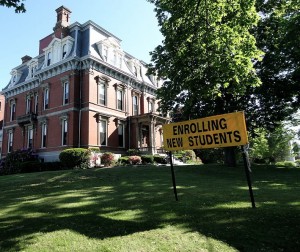 Last year, I was invited to a conference in Washington, D.C. about the 10th anniversary of the Iraq war. I was on a panel of Iraqi scholars and American professors, including some who have provided “advice” to White House officials before, during, and after the occupation of Iraq. As the panel discussions started, one white, heteronormative American professor started talking about how the former Iraqi regime had to be toppled and that, despite the casualties in Iraq, it was worth it. He, along with other speakers, also emphasized that an ideological regime like the former Iraqi regime is dangerous for both Iraqis and the world. Subsequently, I cited Louis Althusser and some decolonial thinkers, in order to discuss how every system, including Western systems, are deeply and disturbingly ideological, and how all of Iraq’s ideological apparatus was negligible next to the American ideological apparatus. He cited the example of the Iraqi educational system under the Baath regime, that was designed to create an Iraqi subject that was in tune with the Baath teachings and ideologies. I responded with a question about the American education system and its part in an ideological apparatus that creates an American citizen and subject that views the world in a particular way, usually with an eye of superiority. I asked, “So what right does the U.S. have to come and destroy Iraq for such a reason?” The American professor did not like my comments. During the break, he approached me and asked, in a rather provocative way: “So, you are at Duke?”
Last year, I was invited to a conference in Washington, D.C. about the 10th anniversary of the Iraq war. I was on a panel of Iraqi scholars and American professors, including some who have provided “advice” to White House officials before, during, and after the occupation of Iraq. As the panel discussions started, one white, heteronormative American professor started talking about how the former Iraqi regime had to be toppled and that, despite the casualties in Iraq, it was worth it. He, along with other speakers, also emphasized that an ideological regime like the former Iraqi regime is dangerous for both Iraqis and the world. Subsequently, I cited Louis Althusser and some decolonial thinkers, in order to discuss how every system, including Western systems, are deeply and disturbingly ideological, and how all of Iraq’s ideological apparatus was negligible next to the American ideological apparatus. He cited the example of the Iraqi educational system under the Baath regime, that was designed to create an Iraqi subject that was in tune with the Baath teachings and ideologies. I responded with a question about the American education system and its part in an ideological apparatus that creates an American citizen and subject that views the world in a particular way, usually with an eye of superiority. I asked, “So what right does the U.S. have to come and destroy Iraq for such a reason?” The American professor did not like my comments. During the break, he approached me and asked, in a rather provocative way: “So, you are at Duke?”
Me: “Yes, I am.”
Professor: “How did you make it to Duke? It is hard to get there, unless you graduate from an Ivy League school. You are lucky!”
 There is so much to unpack in these provocative, racist, and mediocre statements. First, there is some truth in that Ivy League universities tend to circulate the elite, God’s chosen students who more or less dominate the scene. Second, there is the assumption that I got to Duke not because I am qualified, but because I am “lucky.” So, in other words, a white privileged person getting to Duke—or any Ivy League school—would be “smart” and “brilliant,” while students of color, minorities, or those of lower classes are simply “lucky” to be there. Besides being belittling and materially aggressive, these kinds of comments do not take into account the perspectives and insights that come from people with different experiences in the world, like people from war zones and people whose lives were not simply a journey of collecting butterflies and wildflowers at the riverbank. People whose life stories go beyond the theories that are imposed on us in Western academia as the Bible; peoples whose own stories are so powerful that they can become a means of theorizing, in a world where the shirt of the past no longer fits the present. This incident revealed to me the truly precarious position people like me hold in academic settings. Our very presence is an act of war that could shake the foundation from which comments like this professor’s arise. Not to mention that the violence we are up against is not just epistemic, it is material.
There is so much to unpack in these provocative, racist, and mediocre statements. First, there is some truth in that Ivy League universities tend to circulate the elite, God’s chosen students who more or less dominate the scene. Second, there is the assumption that I got to Duke not because I am qualified, but because I am “lucky.” So, in other words, a white privileged person getting to Duke—or any Ivy League school—would be “smart” and “brilliant,” while students of color, minorities, or those of lower classes are simply “lucky” to be there. Besides being belittling and materially aggressive, these kinds of comments do not take into account the perspectives and insights that come from people with different experiences in the world, like people from war zones and people whose lives were not simply a journey of collecting butterflies and wildflowers at the riverbank. People whose life stories go beyond the theories that are imposed on us in Western academia as the Bible; peoples whose own stories are so powerful that they can become a means of theorizing, in a world where the shirt of the past no longer fits the present. This incident revealed to me the truly precarious position people like me hold in academic settings. Our very presence is an act of war that could shake the foundation from which comments like this professor’s arise. Not to mention that the violence we are up against is not just epistemic, it is material.
Voicing Together
American ideals about meritocracy and “pulling yourself up by your boot straps” are myths. They simply do not exist. Education in a capitalist system is not designed to take you out of the class you are born into. People—especially poor people—are duped into thinking that education is a way out of poverty. For example, my parents refused to accept our working class reality. They lived far beyond their means to make us feel like we were middle class. The further along I went in the education, while paying my way through, the more I became painfully aware of the reality of my class. I had to deal with the way my parents still wanted to believe otherwise, because it was too painful for them, as “professionals,” to accept that they would never escape their class either.
Along the same lines, not only are scholars underpaid and overworked in precarious positions, I have come to know a significant amount of graduate students whose financial means and responsibilities make their wages so tight that they have to depend on programs like food stamps and food pantries from time to time in order to make it, all of this while trying to meet the expectations of graduate school. Even if you earn the tenure-track position, these daily realities often do not change, the stage just looks different from the outside. Even if you “make it” through all of these nightmarish hoops, the best place that you can get as a person from a class and background that is deemed “less than” is serving the very people who made it a nightmare in the first place. Even if you are one of these minorities who makes it to the position of a professor at an institution of higher education, having an office and attending cocktail parties with colleagues is hardly an indication of leaving a particular class background. Being an underprivileged minorities in such institutions means we have to work ten times as hard just to stay and our position is as precarious as working class positions outside of the academy. This is the reality we are rarely told.
 Another serious problem that we see in the academy is that it ostensibly trains you to be a critical thinker, yet when you are out in the world (even from inside academia) and are actually critical of what you see around you, you are often punished instead of being acknowledged for critically interrogating the system. This is particularly dangerous for intellectuals, artists, activists, and other people who participate in knowledge production, because people from these groups, when they write or create, purposefully speak directly to what distresses them rather than participating in avoidance or flowery language. There are countless examples of when scholars have had to pay for their critical interventions, by not getting tenured, getting fired, or being eternally marginzalized, all forms of intellectual death while still alive. To give just one example, Ricardo Dominguez was threatened with losing his job (revocation of tenure) in the University of California system for developing the idea of the Transborder Immigrant Tool, which was an application that would allow immigrants to use GPS technology via cheap cell phones to find water stored in the desert between Mexico and Southern California and to access poems, which Dominguez calls “survival poetry.” He was threatened with losing his job when this idea was still in the thought experiment phase. We see a great divide between what the academy claims to be training us to do and the workplace, which wants you to zip your mouth if you want to succeed and advance. As a result, we feel that we are in a very Kafka/Orwellian phase in which the most valued are often those who train people to get corporate and managerial positions, not those who are trained to think. Just look at the number of articles that have come out discouraging prospective humanities and social science students.
Another serious problem that we see in the academy is that it ostensibly trains you to be a critical thinker, yet when you are out in the world (even from inside academia) and are actually critical of what you see around you, you are often punished instead of being acknowledged for critically interrogating the system. This is particularly dangerous for intellectuals, artists, activists, and other people who participate in knowledge production, because people from these groups, when they write or create, purposefully speak directly to what distresses them rather than participating in avoidance or flowery language. There are countless examples of when scholars have had to pay for their critical interventions, by not getting tenured, getting fired, or being eternally marginzalized, all forms of intellectual death while still alive. To give just one example, Ricardo Dominguez was threatened with losing his job (revocation of tenure) in the University of California system for developing the idea of the Transborder Immigrant Tool, which was an application that would allow immigrants to use GPS technology via cheap cell phones to find water stored in the desert between Mexico and Southern California and to access poems, which Dominguez calls “survival poetry.” He was threatened with losing his job when this idea was still in the thought experiment phase. We see a great divide between what the academy claims to be training us to do and the workplace, which wants you to zip your mouth if you want to succeed and advance. As a result, we feel that we are in a very Kafka/Orwellian phase in which the most valued are often those who train people to get corporate and managerial positions, not those who are trained to think. Just look at the number of articles that have come out discouraging prospective humanities and social science students.
We do recognize that there are people who are supportive of difference and diversity, and because of their courage, we are still here. However, such people also come under attack for doing their work with honesty and candor. They are usually named “radical” in a derogatory way, and they often end up dealing with the same challenges that we encounter. They are hyper-scrutinized. They receive attacks that are meant to undermine them rather than foster healthy, scholarly conversation.
Hence, it is crucial to approach these issues and have these conversations very seriously and with great understanding, even in a confrontational manner, rather than use the mask of political correctness and the velvet gloves of hypocritical politeness. If we do not, we end up in a situation that reminds us of the Arabic phrase, “We are the dagger and the wound at the same time.” For injustice to end, the wound must stop cooperating with the dagger. Police us for writing this if you will, but any policing just further proves our point.
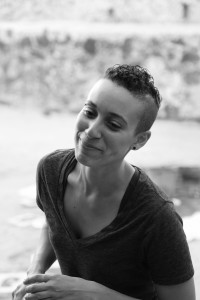 Brittany Chávez is an artist-scholar-activist. They are a performance artist with the internationally-renowned performance troupe La Pocha Nostra and a doctoral student in performance studies at UNC-Chapel Hill. Through their art and scholarship, they continue to push the boundaries of art and activism, life and practice, and body and text.
Brittany Chávez is an artist-scholar-activist. They are a performance artist with the internationally-renowned performance troupe La Pocha Nostra and a doctoral student in performance studies at UNC-Chapel Hill. Through their art and scholarship, they continue to push the boundaries of art and activism, life and practice, and body and text.
Louis Yako is an Iraqi-American writer, poet, and scholar of Cultural Anthropology, researching Iraqi higher education and intellectuals at Duke University.

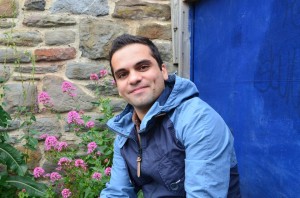

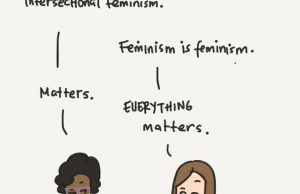

6 Comments